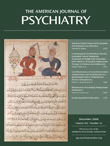Terrorism and Health Services Utilization
To the Editor: It is with great interest that we read the article in the August 2006 issue of the Journal by Itzhak Levav, M.D., M.Sc., et al. on health services utilization under terrorism (1) . The authors used data from a period of observation (Jan. 1, 1999–Dec. 31, 2002) and looked for possible changes in the help-seeking behavior of the general population in Jerusalem. The authors conclude at the end of their article that, except for the elderly and previously hospitalized persons, Jerusalem residents did not increase their use of psychiatric services, but did increase their use of some other health services. Furthermore, they conclude that their results suggest that this population did not perceive their mental and social suffering as requiring specialized intervention. One question that we can ask ourselves, however, is whether this population was not already traumatized and whether they had not already sought more specialized care than might be expected in other nonterrorized countries? The authors themselves summarize the numerous terrorist attacks over the last 60 years. Following these attacks, it would be highly normal for the Jerusalem population to have sought special care preceding the period that was investigated. It would, therefore, be highly interesting to use this important set of data and compare the help-seeking behavior with other countries that have not been terrorized. Furthermore, it would be interesting to see how the help-seeking behavior of this population develops and how the people that do and do not seek help evaluate themselves. As Dr. Levav et al. suggest, most trauma-exposed persons may consider their suffering as a normal psychological reaction. Future research on the attitudes toward help and toward those who seek it might be necessary.
1. Levav I, Novikov I, Grinshpoon A, Rosenblum J, Ponizovsky A: Health services utilization in Jerusalem under terrorism. Am J Psychiatry 2006; 163:1355–1361Google Scholar



